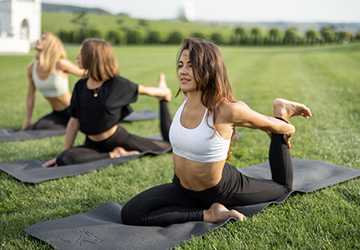The Power of Mind-Body Wellness: A Holistic Approach to Health
Physical and mental health is becoming increasingly important as a holistic approach to achieving and maintaining optimal health in our fast-paced and interconnected world. This comprehensive guide explores the transformative power of physical and mental health and how to connect mental, emotional, and physical health for a more balanced and fulfilling life.

Understand the mind-body connection:
The mind-body connection is a fundamental principle of holistic health. It recognizes the complex relationship between mental and physical health. When we experience stress, anxiety, or other emotional challenges, our bodies often experience physical symptoms. Likewise, physical health affects our mental and emotional state. Understanding this connection forms the basis of a holistic approach to health.
Mindfulness meditation: cultivating present moment awareness:
Mindfulness meditation is a powerful tool for physical and mental health. It's about cultivating present-moment awareness and focusing on the moment without judgment. Regular mindfulness can reduce stress, improve mental clarity, and enhance emotional resilience. Mindful breathing, body scan meditation, and guided imagery can help create a more centred and balanced state.
Yoga: the union of mind, body and soul:
Yoga is a centuries-old practice that embodies the principles of physical and mental health. Yoga connects body, mind and soul through postures (Asian), breath control (pranayama) and meditation. The physical movement promotes flexibility and strength, while the meditative aspect promotes mental calm and emotional balance. Regular yoga practice helps with overall health and reduces stress.
Holistic Nutrition: Nourishing the Mind and Body:
Holistic nutrition emphasizes the connection between nutrition and overall health. It goes beyond counting calories and considers the nutritional quality of food and its impact on physical and mental health. A balanced, healthy, nutrient-dense diet contributes to optimal brain function, emotional stability, and physical vitality. Hydration also plays a vital role in maintaining overall health.
Emotional Intelligence: Understanding and Managing Emotions:
Emotional intelligence is an essential component of physical and mental health. It's about understanding and managing your own emotions and empathizing with others. Developing emotional intelligence can help build healthier relationships, reduce stress, and improve mental health. Journaling, therapy, and self-reflection can increase emotional awareness and resilience.
Art and Creativity: Expressing Your Inner Self:
Engaging in creativity through visual art, writing, music, or other forms of expression is a holistic approach to physical and mental health. Creativity enables individuals to tap into their inner selves, express emotions, and develop a sense of purpose. Creative activities are associated with reduced stress, increased positive emotions, and improved overall well-being.
Physical activity promotes mental health:
Regular physical activity is essential for physical health and profoundly impacts mental health. Physical exercise releases endorphins, neurotransmitters acting as natural mood enhancers. Whether taking a brisk walk, working out at the gym, or taking a dance class, incorporating physical activity into your daily routine can improve cognitive function, reduce stress, and promote better sleep.
Naturopathy: Connecting with Nature:
Naturopathy, also known as ecotherapy, emphasizes the healing power of nature for mental and emotional health. Spending time outdoors, whether in parks, forests or near water, has been linked to reduced stress, improved mood and improved overall mental health. Connection with nature can promote feelings of calm and connection.

Sleep Hygiene: Restful sleep for mind and body:
Good sleep is the cornerstone of physical and mental health. Adopting good sleep hygiene practices such as B. Maintaining a consistent sleep schedule, creating a comfortable sleep environment and limiting screen time before bed can help physical and mental health. Adequate, restful sleep improves cognitive function, emotional resilience, and energy.
Mind-body exercises to reduce stress:
Stress is ubiquitous in modern life, and managing it is essential for physical and mental health. In addition to mindfulness meditation and yoga, progressive muscle relaxation, breathing exercises, and biofeedback can help reduce stress. These techniques help activate the body's relaxation response and promote a state of calm and balance.
Professional support for physical and mental health:
While self-care practices are effective, seeking professional support is essential to physical and psychological health. Therapists, counsellors, and holistic health practitioners can provide guidance, support, and personalized strategies to address challenges and promote overall wellness.
Conclusion:
To harness the power of physical and mental health, people must recognize the connection between mental, emotional and physical health. By incorporating mindfulness practices, engaging in activities that encourage creativity, prioritizing physical activity, connecting with nature, ensuring restful sleep, and seeking professional support when needed, individuals can develop a holistic approach to health. Wellness is not a one-size-fits-all journey but a personal exploration that can lead to a more balanced, fulfilling and healthy life.


